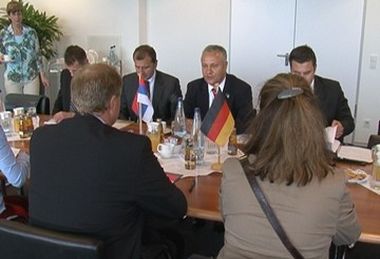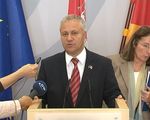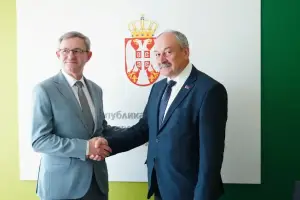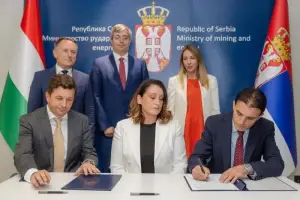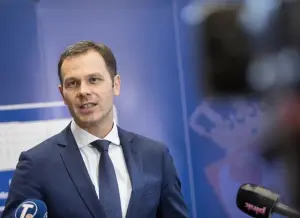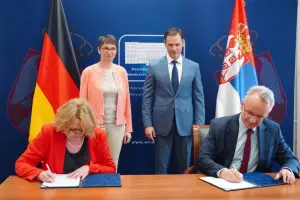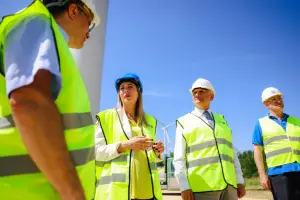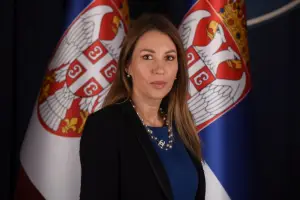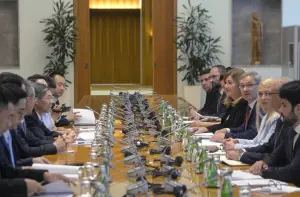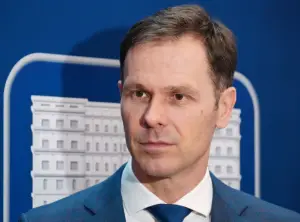Q:
A:
Ten German companies interested in investing in Serbia
Belgrade/Berlin,
24 August 2010
Deputy Prime Minister for Economy and Regional Development Mladjan Dinkic stated today in Berlin that an increasing number of German companies are becoming interested in investing in Serbia.
Dinkic met with State Secretary of the Ministry of Economics and Technology Bernd Pfaffenbach in Berlin today. He also met with several potential investors.
He said that recently 12 German companies started implementing investment projects throughout Serbia, adding that currently negotiations are going on with ten more companies.
Five of the companies with which investment is being discussed belong to the car industry, which is a sector offering a lot of potential for cooperation between the two countries, explained Dinkic.
Continental, a German company, has offered long term cooperation with the Nis based factory Vulkan. They have informed us that they plan to initiate a greenfield project in the car industry sector. During the first phase of this project 250 jobs will be created and a further 600 during the next one, underlined Dinkic.
Minister Dinkic also talked today with representatives of Stada, a German pharmaceutical company, which is the majority owner of Hemofarm from Vrsac and also the top German investor in Serbia, having invested €650 million.
Stada CEO has announced plans to increase production at Hemofarm, the manufacture of new medicines and the modernisation of a research centre in Vrsac, Dinkic elaborated.
Today’s session of the German-Serbian Business Council, attended by officials and businesspeople from the two countries, focused on the improvement of economic cooperation. The meeting was concluded to be very successful.
Germany is Serbia’s most important trade partner, considering the high level of goods trade, highlighted Dinkic, adding that Serbia increased its exports to Germany by 15% during the first half of this year.
We are encouraged by the fact that the German economy is recovering quickly, and since Germany is one of our biggest export markets, we are sure that its recovery will influence the recovery of Serbian industry as well, the Deputy Prime Minister noted.
At today’s session of the Business Council important strategic projects in the areas of energy and rail and air transport were also discussed.
After the session, Dinkic confirmed that the German KfW energy company announced the possibility of drafting a feasibility study on the construction of a hydroelectric power plant on Velika Morava. He added that representatives of the German company were interested in the construction of infrastructure in Serbia.
Great interest was expressed in rail infrastructure projects, particularly the improvement of the Koln-Germany rail line in order to reduce the present travel time of 35 hours to 25, announced Dinkic.
The modernisation of the rail line from Pancevo to the Romanian border was also discussed.
The possibility of buying Airbus planes for Jat Airways was discussed as well; the Minister outlined and confirmed that negotiations on this subject will be concluded in the coming months making it possible to upgrade the Jat Airways fleet.
The Business Council discussed at its meeting today important strategic projects in the fields of energy, railway and air traffic. During the day, Dinkic will also meet with German Minister for Economic Development and Cooperation Dirk Niebel.
Around 250 German companies and representative offices do business in Serbia and employ more than 20,000 workers, in all crucial sectors of the economy – industrial cooperation, banking and finance, transport, energy and tourism.
Total German investment in Serbia amounts to €1.3 billion, making Germany the fourth largest investor in Serbia (following Austria, Greece and Norway).
The largest German investors are companies Stada, Metro Cash&Carry, Messer and Henkel, and important ones are also Leoni, Reum, Draexlmaier and Grammer.
German companies in the Serbian market contribute to the progress of Serbia’s overall economy since they are mostly export-oriented and employ a large number of workers.
One of the positive effects of German companies on the Serbian economy is the establishment of European standards in the field of the environment, usage of renewable energy sources and sustainable development.
Germany is Serbia’s largest foreign trade partner in the EU as well as globally, with a 2009 trade volume of approximately €2 billion (exports €624.3 million, imports €1.4 billion).
A special contribution to the improvement of bilateral economic cooperation is given by the Delegation of the German Economy for Serbia and Montenegro, the German Economic Association and the Germany Trade & Invest organisation.
He said that recently 12 German companies started implementing investment projects throughout Serbia, adding that currently negotiations are going on with ten more companies.
Five of the companies with which investment is being discussed belong to the car industry, which is a sector offering a lot of potential for cooperation between the two countries, explained Dinkic.
Continental, a German company, has offered long term cooperation with the Nis based factory Vulkan. They have informed us that they plan to initiate a greenfield project in the car industry sector. During the first phase of this project 250 jobs will be created and a further 600 during the next one, underlined Dinkic.
Minister Dinkic also talked today with representatives of Stada, a German pharmaceutical company, which is the majority owner of Hemofarm from Vrsac and also the top German investor in Serbia, having invested €650 million.
Stada CEO has announced plans to increase production at Hemofarm, the manufacture of new medicines and the modernisation of a research centre in Vrsac, Dinkic elaborated.
Today’s session of the German-Serbian Business Council, attended by officials and businesspeople from the two countries, focused on the improvement of economic cooperation. The meeting was concluded to be very successful.
Germany is Serbia’s most important trade partner, considering the high level of goods trade, highlighted Dinkic, adding that Serbia increased its exports to Germany by 15% during the first half of this year.
We are encouraged by the fact that the German economy is recovering quickly, and since Germany is one of our biggest export markets, we are sure that its recovery will influence the recovery of Serbian industry as well, the Deputy Prime Minister noted.
At today’s session of the Business Council important strategic projects in the areas of energy and rail and air transport were also discussed.
After the session, Dinkic confirmed that the German KfW energy company announced the possibility of drafting a feasibility study on the construction of a hydroelectric power plant on Velika Morava. He added that representatives of the German company were interested in the construction of infrastructure in Serbia.
Great interest was expressed in rail infrastructure projects, particularly the improvement of the Koln-Germany rail line in order to reduce the present travel time of 35 hours to 25, announced Dinkic.
The modernisation of the rail line from Pancevo to the Romanian border was also discussed.
The possibility of buying Airbus planes for Jat Airways was discussed as well; the Minister outlined and confirmed that negotiations on this subject will be concluded in the coming months making it possible to upgrade the Jat Airways fleet.
The Business Council discussed at its meeting today important strategic projects in the fields of energy, railway and air traffic. During the day, Dinkic will also meet with German Minister for Economic Development and Cooperation Dirk Niebel.
Around 250 German companies and representative offices do business in Serbia and employ more than 20,000 workers, in all crucial sectors of the economy – industrial cooperation, banking and finance, transport, energy and tourism.
Total German investment in Serbia amounts to €1.3 billion, making Germany the fourth largest investor in Serbia (following Austria, Greece and Norway).
The largest German investors are companies Stada, Metro Cash&Carry, Messer and Henkel, and important ones are also Leoni, Reum, Draexlmaier and Grammer.
German companies in the Serbian market contribute to the progress of Serbia’s overall economy since they are mostly export-oriented and employ a large number of workers.
One of the positive effects of German companies on the Serbian economy is the establishment of European standards in the field of the environment, usage of renewable energy sources and sustainable development.
Germany is Serbia’s largest foreign trade partner in the EU as well as globally, with a 2009 trade volume of approximately €2 billion (exports €624.3 million, imports €1.4 billion).
A special contribution to the improvement of bilateral economic cooperation is given by the Delegation of the German Economy for Serbia and Montenegro, the German Economic Association and the Germany Trade & Invest organisation.

